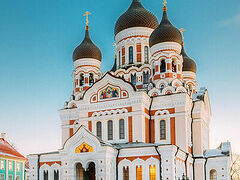Tallinn, May 13, 2024
 St. Alexander Nevsky Cathedral in Tallinn. Photo: postimees.ee
St. Alexander Nevsky Cathedral in Tallinn. Photo: postimees.ee
The Riigikogu adopted a statement on Monday, May 6, which formally identifies the Moscow Patriarchate as a supporter of Russian aggression against Ukraine.
The 101-seat Parliament voted 75-8 in favor of the statement, “On Declaring the Moscow Patriarchate an Institution Sponsoring the Military Aggression of the Russian Federation,” reports Postimee.
The act notes that His Holiness Patriarch Kirill has publicly expressed his support for the war in Ukraine, and states that the leaders of the MP are using the Russian World ideology to militarize Russian society and promote the war.
In particular, the Parliamentary statement points to the recent document published by the World Russian People’s Council, which talks of a “holy war” in Ukraine and expanding the influence of the Russian Federation.
Thus, “The calls of the Moscow Patriarchate contain an inherent danger to Estonia’s security and survival, including a direct threat to the public and constitutional order in Estonia,” the Estonian Parliament believes.
Therefore, the members of Parliament expect the parishes of the Estonian Orthodox Church to initiate the process of cutting ties with the Moscow Patriarchate.
The Estonian Church has repeatedly explained to politicians that it is administratively centered in Tallinn, with autonomy from Moscow, and that its hierarchs and people do not support statements such as that of the World Russian People’s Council.
And the day after the Riigikogu’s vote, the Church issued another statement, from His Grace Bishop Daniel, vicar of the Tallinn Diocese (recall that the ruling hierarch, His Eminence Metropolitan Evgeny was already branded a threat to state security for being a member of the Moscow Patriarchate and forced to leave Estonia).
His Grace reiterates the Church’s stance on the relevant issues, and again recalls that the same politicians who are threatening to close parishes if they don’t leave the Moscow Patriarchate have acknowledged several times that they have found no actual security threats from any members of the Estonian Orthodox Church.
He also again notes that the World Russian People’s Council is a public forum, not a body of the Church or one that speaks for the Church.
We have repeatedly emphasized that the World Russian People’s Council is a socio-political organization that includes a number of state, public, and political organizations operating in Russia. The chairman of the People’s Council is the Primate of the Russian Orthodox Church, but still we’re not talking about a Church organization that would speak on behalf of the Church, especially on behalf of the EOC-MP. In addition to the Patriarch and a number of bishops of the Russian Orthodox Church, the People’s Council also includes rectors and professors of universities, chairmen of legislative assemblies of regions and cities, editors-in-chief of children’s magazines, etc. Will it now become the task of the Estonian Parliament to declare all these organizations separately as justifying aggression?
As for the EOC-MP and its parishes, both the Minister of Internal Affairs and a number of other politicians admitted that no violations had been identified and there was nothing to reproach them with. If we try to characterize the so-called average believer of the Church, we could say that he does not seek confrontation and conflict with the state in which he lives. At every service, we also pray for our country, our people and our defensive troops. There have been no trials in which any of our clergy, church workers, or active laymen were found guilty of violating the constitutional order of Estonia. However, despite this, through the media, members of our Church are addressed with certain claims and demand self-justification. Is the presumption of innocence no longer valid for members of our Church? The current statement of the Russian People’s Council and its interpretation have created the impression in society that the members of our Church are guilty, which must be expiated by public renunciation, severing ties with their roots and origins. If such decisions were born within the community and according to its conviction, it would be possible to find a solution, and this would be canonically correct. But if this is done solely at the insistence of secular authorities, putting pressure on the freedom of religion and conscience of parishioners and clergy and neglecting their constitutional rights and canonical rules of the Church, then it is unlikely that there will be any benefit to society from such a course of action.
On April 23, a delegation from the Estonian Ministry of Internal Affairs arrived at the Holy Dormition-Pukhtitsa Monastery in Kuremäe, Estonia, to discuss the future of the monastery in terms of its ecclesiastical jurisdiction. The monastery has been stavropegial—directly under the omophorion of the Patriarch of Moscow—since the time of His Holiness Patriarch Alexei II.
The monastery then issued a statement saying if the state wants the monastery to separate from the Moscow Patriarchate, let the state appeal to the Patriarch. It also appealed to the Estonian Council of Churches, asking for a show of “goodwill, diplomatic tact, and support for the stability of life of Pukhtitsa Monastery,” and to help “deliver it from conditions that have all the signs of political pressure on a law-abiding, apolitical monastic habitation.”
Follow OrthoChristian on Twitter, Vkontakte, Telegram, WhatsApp, MeWe, and Gab!



